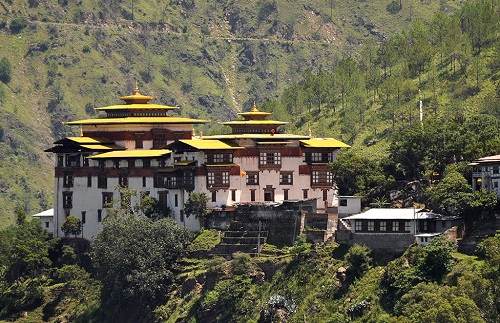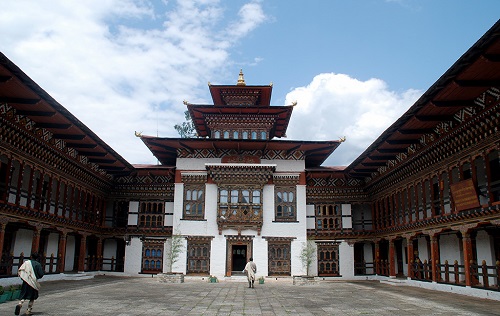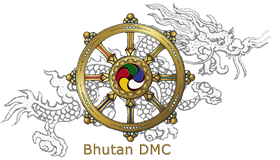Trashigang & Trashigyantse- Tourist Destination in Bhutan
In the far east of Bhutan, on the bank of Gamri Chhu river lies Trashigang, the country’s largest district. Trashigang, once the centre of a busy trade route with Tibet, is today the junction of east-west highway with road connecting to Samdrup Jongkhar and then to the Indian States of Assam. This town is also used as the market place for the semi nomadic people from Merak and Sakteng whose costumes are unique in Bhutan.
the junction of east-west highway with road connecting to Samdrup Jongkhar and then to the Indian States of Assam. This town is also used as the market place for the semi nomadic people from Merak and Sakteng whose costumes are unique in Bhutan.
Places of Interest in Trashigang (Altitude 1,100m)
Trashigang Dzong
Trashigang Dzong or ‘The Fortress of the Auspicious Hill’ was built in 1659, to defend against Tibetan invasions. This imposing fortress is strategically situated high atop a spur overlooking the Dangme Chhu river. According to legend it is said that upon seeing the Dzong, invading Tibetan armies remarked that the Dzong was ‘not on the ground. It is a Sky Dzong’ before retreating. It has been the political stronghold of Eastern Bhutan for over 300 years. Due to its location Trashigang Dzong is one of the most strategically placed Dzongs in Bhutan. The present Dzong was enlarged by Dzongpon Dopola, in 1936.
Gom Kora
24 km from Trashigang, the temple of Gom Kora is set on a small alluvial plateau overlooking the river. Surrounded by rice fields and clumps of banana tress, it looks like an oasis in an arid landscape. It is one of the famous places where Guru Rinpoche meditated in order to subdue a demon who dwelt in a huge black rock.
Ranjung Woesel Chhoeling Monastery
An hour drive from eastern Bhutan’s town of Trashigang through the Chir Pine Forests, along the banks of Gamri Chhu rivers, takes one to satellite town of Ranjung which is home to Ranjung Woesel Monastery of Dhujom Dharma Lineage founded by H.E Garab Rinpoche, in 1989. The objective of monastery is to provide a conducive heaven for the study of Buddha dharma as expounded in the Dudjom New Treasure Lineage and carry out dharma activities for the benefit of the Buddhist community in and abroad the country. It has a flourishing community with branches monasteries and retreat centers.
Radhi Village
The beautiful Radhi village is famous for its rice fields and skill of its weavers. The village is also known as ‘Rice Bowl of the East’ owing to its verdant rice fields that supply most of the grain to the eastern part of the country. The inhabitants of Radhi are also skilful weavers and indulge in weaving from fine raw silk or ‘bura textile’ during off-agricultural season. All textiles produced in Radhi are made using the traditional back-strap loom and traditional dyes and as a result Radhi village produces some of the most authentic high quality raw silk textiles to be found anywhere in Bhutan.
Trashiyangtse (Altitude 1,700m)
Trashiyangtse is a small village with a garden aspect and a lovely place from where to launch a couples of hours stroll into surrounding countryside. The Dzong was built in the later 1990s when the new district was created. A very interest art school is worth the visit. Also Trashiyangtse is famous for its wooden containers and bowls.
Places of Interest in Trashiyangtse
Chorten Kora
Constructed near the river, it is based on the stupa of Bodhnath in Nepal and was built in 1740 by Lama Ngawang Loday. During the second month of lunar calendar there is an interesting celebration here, known as ‘Kora’.
Bumdeling Valley
Bumdeling forms the easternmost range for the wintering ground of the endangered, Black-necked cranes, and is the only place in Bhutan where Bhutan’s Swallowtail was rediscovered after a long gap since its first discovery in 1932. Bumdeling valley is located about one hour walk from Chorten Kora which is situated in vicinity of Trashiyangtse town.
Every year BLACK-NECKED CRANE FESTIVAL is organized at Bumdeling Valley by Bumdeling Wildlife Sanctuary (BWS) in collaboration with Royal Society for Protection of Nature (RSPN) to educate local people and create awareness about its importance in environment and its conservational status, to celebrate their coexistence, and to celebrate annual arrival of this heavenly bird.
HOTELS IN THIMPHU
HOTELS IN PUNAKHA & WANGDUE
HOTELS IN GANGTEY
HOTELS IN TRONGSA
HOTELS IN BUMTHANG
HOTELS IN MONGAR
HOTELS IN TRASHIGANG
HOTELS IN SAMDRUP JONGKHAR
HOTELS IN PHUENTSHOLING
HOTELS IN HAA
HOTELS IN GELEPHU
HOTELS IN ZHEMGANG
RESTAURANTS IN PARO
RESTAURANTS IN THIMPHU
RESTAURANTS IN PUNAKHA
TOUR ITINERARIES
TREKKING ITINERARIES
SPECIAL INTERESTS TOURS
UNIQUE FESTIVALS & FAIRS
BLOG


